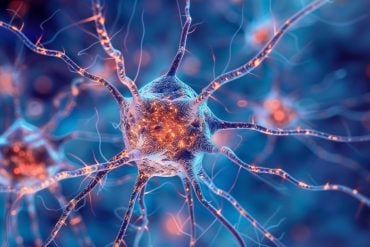Summary: The use of naproxen, an NSAID anti-inflammatory, increases the frequency of adverse health effects and does not reduce the risk of developing Alzheimer’s disease.
Source: McGill University
Researchers have known for decades that inflammation accompanies Alzheimer’s disease (AD) brain lesions. Several early studies suggested that “super-aspirins” or Nonsteroidal anti-inflammatory drugs (NSAID) could help avoid the disease. However, after clinical trials showed that NSAIDs don’t help patients who already have AD symptoms, doctors wondered whether these drugs could still be helpful to people who were at risk of developing the disease, but weren’t yet showing symptoms.
To test this hypothesis, researchers at McGill University’s Faculty of Medicine developed a new approach to AD prevention trials and used it to test whether the common NSAID naproxen could indeed stop the disease in its tracks before people developed AD symptoms. Sadly, the results were not encouraging, according to research published in the April 5, 2019, online issue of Neurology.
“To give the NSAID story one more chance to end well, we enrolled trial participants at the earliest stages of disease development, before they exhibited cognitive impairment,” explains Dr. John Breitner, Professor of Psychiatry at McGill and the study’s senior author.
“The resulting trial, known as INTREPAD, examined the effects of naproxen in people who had a strong family history of AD but ‘squeaky-clean’ memory and other cognitive abilities.”
Developing a new method to assess effectiveness
Many researchers have noted the special challenge of measuring disease development at a time when they could not rely on symptoms to assess effects of a treatment. To deal with this challenge the McGill team collaborated in developing a new Alzheimer Progression Score (APS) that was shown elsewhere to predict the onset of clinical disease over the coming decade or more. The APS measures the early development of disease by combining many little changes into a composite score.
Applying the APS to a trial sample of 200 people (100 assigned to naproxen and 100 to placebo), the INTREPAD results showed real changes over the two-year trial period. However, there was no evidence that the APS change was reduced in those taking naproxen. “The usual side effects were there,” notes Pierre- François Meyer, a PhD candidate in Dr. Breitner’s lab and the study’s first author, “but there was not the slightest suggestion of any benefit.”

“We think this is the end of the road for the use of NSAIDs for treatment or prevention of Alzheimer’s disease, and it suggests a need for caution about using other anti-inflammatory drugs for this purpose,” adds Dr. Breitner, who is Founding Director of the Centre for Studies on Prevention of Alzheimer’s Disease at the Research Centre of the Douglas Mental Health University Institute. “The world desperately needs a way to prevent this horrible disease,” he says, “and many other avenues are being investigated.” In this process, researchers argue ever more strongly for the importance of publishing negative or “null” trial results like this one.
Source:
McGill University
Media Contacts:
Jason Clement – McGill University
Image Source:
The image is in the public domain.
Original Research: Closed access
“INTREPAD: A randomized trial of naproxen to slow progress of presymptomatic Alzheimer disease”.
Pierre-François Meyer, Jennifer Tremblay-Mercier, Jeannie Leoutsakos, Cécile Madjar, Marie-Élyse Lafaille-Maignan, Melissa Savard, Pedro Rosa-Neto, Judes Poirier, Pierre Etienne, John Breitner, for the PREVENT-AD research group
Neurology Apr 2019 doi:10.1212/WNL.0000000000007232
Abstract
INTREPAD: A randomized trial of naproxen to slow progress of presymptomatic Alzheimer disease
Abstract
Objective To evaluate the safety and efficacy of low-dose naproxen for prevention of progression in presymptomatic Alzheimer disease (AD) among cognitively intact persons at risk.
Methods Investigation of Naproxen Treatment Effects in Pre-symptomatic Alzheimer’s Disease (INTREPAD), a 2-year double-masked pharmaco-prevention trial, enrolled 195 AD family history–positive elderly (mean age 63 years) participants screened carefully to exclude cognitive disorder (NCT-02702817). These were randomized 1:1 to naproxen sodium 220 mg twice daily or placebo. Multimodal imaging, neurosensory, cognitive, and (in ∼50%) CSF biomarker evaluations were performed at baseline, 3, 12, and 24 months. A modified intent-to-treat analysis considered 160 participants who remained on-treatment through their first follow-up examination. The primary outcome was rate of change in a multimodal composite presymptomatic Alzheimer Progression Score (APS).
Results Naproxen-treated individuals showed a clear excess of adverse events. Among treatment groups combined, the APS increased by 0.102 points/year (SE 0.014; p < 10−12), but rate of change showed little difference by treatment assignment (0.019 points/year). The treatment-related rate ratio of 1.16 (95% confidence interval 0.64–1.96) suggested that naproxen does not reduce the rate of APS progression by more than 36%. Secondary analyses revealed no notable treatment effects on individual CSF, cognitive, or neurosensory biomarker indicators of progressive presymptomatic AD.
Conclusions In cognitively intact individuals at risk, sustained treatment with naproxen sodium 220 mg twice daily increases frequency of adverse health effects but does not reduce apparent progression of presymptomatic AD.
Classification of evidence This study provides Class I evidence that, for people who are cognitively intact, low-dose naproxen does not significantly reduce progression of a composite indicator of presymptomatic AD.






